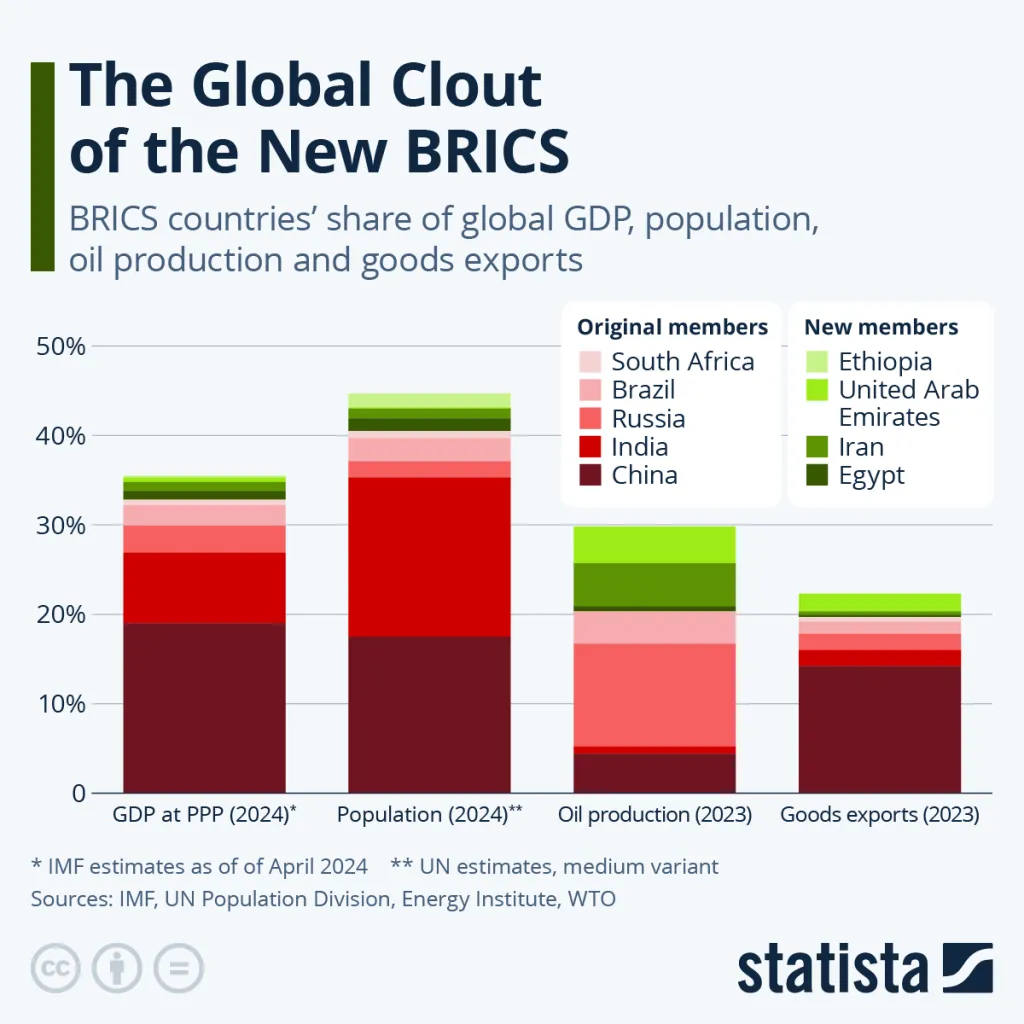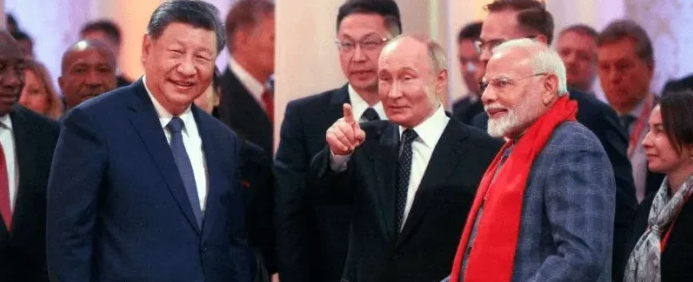Nikos Anastasiadis
One can’t find much news and analysis in western media about the recent, 16thBRICS+ summit in Kazan, Russia. When one does find some news, they are partial and biased. There is a clear attempt to downplay the significance of BRICS+ in the context of the geopolitical war between the old western imperialist powers and the rising bloc around China. So, what happened in Kazan?
What are BRICS+?
BRICS is an acronym for Brazil, Russia, India, China, and South Africa. It represents a bloc of emerging and fast growing economies that are outside the G7 (US, UK, France, Germany, Japan, Canada, and Italy). Following its recent summit in Johannesburg in August 2023, four new countries joined BRICS: Egypt, Ethiopia, United Arab Emirates and Iran). Argentina and Saudi Arabia were also initially announced as new members, but Argentina cancelled its bid after the far-right Mileiwon the elections (he said he “would not promote relations with communists”) and the Saudis are still undecided on their membership status.
The 9-member BRICS (aka BRICS+) account for about 1/3 of world GDP (PPP* adjusted), 40% of the world’s population and 30% of oil production. For comparison, G7 has 10% of the world’s population and 30% of world GDP (PPP adjusted).

There is a clear trend for the BRICS+ bloc to gain ground, while the G7 bloc is losing ground (read more of our analysis on BRICS here, here and here).
Kazan summit: important aspects
The October 22-24 Kazan summit was important in a number of respects:
- It showed that Russia is far from “isolated” as it could host a meeting with 36 heads of state (from countries representing 57% of world population) plus the UN Secretary General.
- It was marked by a landmark agreement between India and China about their Himalayas border dispute which is interpreted asa beginning of normalisation of relations.
- It was announced that 13 new countries would acquire the status of BRICS partner countries. These are: Algeria, Belarus, Bolivia, Cuba, Indonesia, Kazakhstan, Malaysia, Nigeria, Thailand, Türkiye, Uganda, Uzbekistan, Vietnam (the partner membership of Venezuela was blocked by Brazil, leading to a heated reply by Maduro).
- The BRICS+ countries agreed to sign a long declaration, taking up a number of world political issues.
The declaration
The Kazan summit was a highly symbolic event that showcased that a significant number of important countries are discussing ways to escape the grip of western imperialism and challenge its power. That by itself is an important development.
But the content of the BRICS declaration itself was poor. To start with, it is very vague. It tries to take up a big number of political points but these are commented with generalities. BRICS+ leaders mainly talk about “reforming” the UN, the WTO, the Bretton Woods institutions (IMF and World Bank), ect.
Some key quotes from the 32-page declaration are the following:
“…we reaffirm our commitment to multilateralism and upholding the international law, including the Purposes and Principles enshrined in the Charter of the United Nations (UN) as its indispensable cornerstone, and the central role of the UN in the international system…”
“We reaffirm our support for the rules-based, open, transparent, fair, predictable,inclusive, equitable, non-discriminatory, consensus-based multilateral trading systemwith the World Trade Organisation (WTO) at its core…”
“We reaffirm our commitment to maintaining a strong and effective Global Financial Safety Net with a quota-based and adequately resourced IMF at its center. We call for the reform of the Bretton Woods institutions…”
“We underscore the key role of the G20 as the premier global forum for multilateral economic and financial cooperation… We recall that the UNFCCC, including the annual Conference of the Parties (COP) sessions, is the primary and legitimate international forum to discuss the issue of climate change in all its dimensions.”
As is clear, BRICS aim for an enhanced role for themselves in international institutions, in order to have a bigger say within these institutions and outflank the Western imperialist powers who are in control, and particularly the USA.
The irony
Reading the declaration, it is difficult to miss the irony about who says what. So, the Iranian regime, which has its “morality police” violently suppressing, including murdering,women, signs a declaration which says:
“We underline the importance of women’s empowerment and their full participation on the basis of equality in all spheres of society, including their active participation in decision-making processes…”
Xi Jinping, who leads a regime which suppresses dissentand employs a huge censorship and repression mechanism, has signed a declaration that states that:
“We emphasise the importance of information integrity and ensuring free flow of and public access to accurate fact-based information, including the freedom of opinion and expression”
Indian PM N. Modi, who is governing with a racist, far-right agenda, signed the following:
“[We] acknowledge the need to intensify the fight against racism, racial discrimination, xenophobia and related intolerance as well as discrimination based on religion, faith or belief, and all their contemporary forms around the world including the alarming trends of rising hate speech”
Putin’s Russia, engaged in several wars, and during the last 2 years at war with Ukraine, “agreed” to:
“…support all efforts conducive to the peaceful settlement of crises”
Leaders of regimes that have a long record of anti-working-class policies (eg Turkey) or are sweatshop economies (eg Vietnam) state that they want:
an “equitable labour market” and “decent work, fair compensation, and social protection for all…”.
Probably the most hypocritical part is the one on Palestine. While the BRICS+ states declare they are “concerned” and “alarmed” and they “denounce” some of Israel’s attacks, they do nothing to practically pressurize Israel to stop the massacre in Gaza (and now in Lebanon). If BRICS members decided to sanction and boycott Israel’s economy, they could exert additional pressure on it. Instead, China is still buying arms from Israel, South Africa is still selling coal, India is still selling refined petroleum, ect. So, they call for “urgent measures… to ensure the protection of lives” but they are not taking any, despite the fact that they have the power to do so…
What should be clear to the workers’ movement internationally is that BRICS+ do not offer any kind of a “progressive alternative” to western imperialism, despite the claims of some sections of the Left to the opposite.
The die is cast, but the road is long and bumpy
The Russian presidency published a long document with its proposals regarding finance. On this, the final declaration states:
“We welcome the use of local currencies in financial transactions between BRICS countries and their trading partners. We encourage strengthening of correspondent banking networks within BRICS and enabling settlements in local currencies in line with BRICS Cross-Border Payments Initiative (BCBPI), which is voluntary and non-binding, and look forward to further discussions in this area, including in the BRICS Payment Task Force.”
“We agree to discuss and study the feasibility of establishment of an independent cross-border settlement and depositary infrastructure, BRICS Clear, an initiative to complement the existing financial market infrastructure…”
“We task our Finance Ministers and Central Bank Governors, as appropriate, to continue consideration of the issue of local currencies, payment instruments and platforms and report back to us by the next Presidency”
The discussion around de-dollarisation lit up after the recent sanctions against Russia following the war in Ukraine. A number of countries realised that they could be next in this process of financial straightjacket that the West imposed on whoever falls out of line. A number of countries understand that they need to “diversify” their financial systems, so they can endure western pressure.
The Russian proposal makes some valid comments about the world financial system. It stresses the fact that the financial architecture favours western powers, especially the US. It presents figures which show that, although the production and trade focus is moving towards emerging economies, the profits are still centred around advanced economies. It seems to favourably recall the period of unhindered globalisation, and criticises the recent turn towards more trade barriers.
This discussion is reflecting exactly the stage of geopolitical relations. The “old” imperialist powers are in decline, so, in order to hold on to their “legacy mechanisms” that maintain their dominance, they strive to place barriers in the growth of their antagonists’ economies. This is the exact opposite of their policy of “free trade” when their economies were growing and were more competitive. On the other hand, the “new” capitalist powers want to establish their economic power.
As the Russian proposal states
“At the outset, we recognize natural constraints and the will of the free market and therefore we do not seek to replace the US-dollar as a medium of exchange as it represents a large share of the global economy; instead, we seek to offer a viable alternative that will aid the market in its perpetual mission of efficiency and in search of greater prosperity, and promote a universally beneficial and inclusive economic globalization.”
So, the BRICS+ efforts will be focused on using local currencies for intra-national trade. This process, of course, has its own internal contradictions, but still it represents a challenge to the dollar and to US domination.
There is a sea-change coming in the world economy in the years to come. Although different things may complicate the ascent of new powers and limit the descent of the old ones, the trend is clear. But the road to this change is long and bumpy, and will not take place peacefully under capitalism.
*Purchasing power parity is the exchange rate at which the currency of one nation must be converted into the currency of another so that the same products and services can be purchased in each country.












